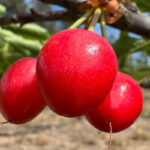Opinion: Current fruit breeding practices - fruitful or futile?

By Johns Hopkins University PhD student in health policy management, Eleanore Alexander, and Cullman Chemoprotection Center director, Jed W. Fahey
Following the low-fat fad in the 1990s and the low-carb craze of the 2000s, sugar has become the new nutrient of focus. Sugar has been investigated for its role in diseases ranging from heart disease to cancer.
Processed foods with added sugars have been heavily criticized, and sodas are now touting that they include "real sugar" instead of high fructose corn syrup. Some consumers are staying away from fruit because of its "high sugar content", yet fruit contains no added sugar and contains nutrients and fiber; components of a healthy diet.
In this current sugar confusion, you may be wondering: is fruit being bred to keep up with consumer preferences for sweetness?
While some fruits such as apples have been bred for sweetness over the years, the vitamin content of fresh fruits has also changed over time. Michael Pollan has stated, "For plants to create all these interesting phytochemicals that nourish us, they need a complex soil. So crops that get lots of nitrogen fertilizer and little else tend to be less complex and less nutritious."
While this oversimplifies and generalizes a bit much, it is fair to say that over the years fruit has declined in vitamin content due to depleted soil resulting from agricultural practices to grow foods hardier and faster, rather than focusing on nutrition.
Breeding for sweetness does not necessitate removing nutrients, which is a separate problem related to soil and agricultural practices. However, breeding plants to produce both fruit and vegetables that have lower levels of protective phytochemicals (the plant protective compounds that contribute so mightily to taste – many of them bitter) has happened as a consequence of increasing their dependence on pesticides to protect them from bacterial and fungal pathogens.
Plants have to stand and fight, and the primary way that they do that is with their phytochemical arsenal. Also, breeding for sweeter, bigger, or juicier – and less bitter – often means neglecting the components that lead to the fabulous tastes of so many fruit and vegetables. Is this inverse correlation a biochemical, energetic, and genetic must? Probably not, but it seems to be a reality nonetheless.
In the past few years the science of "bitter" has exploded thanks to the discoveries that our taste receptors (located in cell membranes), and in particular our bitter taste receptors, are expressed in a wide variety of organs including the testes, nose, lungs, airway, various gut-associated endocrine cells, and of course the tongue.
Whereas sensitivity to bitter taste has long been thought to have survival value (many poisonous plants are bitter), it may also be a lifesaver in a much more indirect way, signaling appetite reduction and facilitating maintenance of a healthy body weight!
In fact a recent paper by Campa and colleagues in the scientific journal PLOS ONE presents the tantalizing suggestion that "genetic variations [in bitter taste receptors] can affect profoundly various traits, including longevity, in a way that we are just beginning to understand."
Agricultural practices aiming for large, perfectly shaped fruits are the real challenge that must be addressed. These practices have led to poor soil and decreased nutrient quality of fruits (e.g. vitamins and minerals). Although there is less robust data on how the loss of phytochemicals occurs, the abundance of these minor, but potent compounds also clearly declines with intensive breeding for industrial agriculture.
Alternating crops and using organic growing methods can help reintroduce nutrients in the soil, yet overall there are no incentives for producers to slow production and take care of the soil. To reverse the trend of decreasing vitamin and phytochemical content, consumers must demand fruits and vegetables that come from farms using better practices that result in higher nutrient quality.
Eleanore Alexander, MSPH, PhD student in Health Policy and Management, Johns Hopkins Bloomberg School of Public Health, Baltimore, MD, USA.
Jed W. Fahey, MS, ScD, Director, Cullman Chemoprotection Center, Department of Pharmacology and Molecular Sciences, School of Medicine & Center for Human Nutrition, Bloomberg School of Public Health, Johns Hopkins University, Baltimore, MD, USA.











































